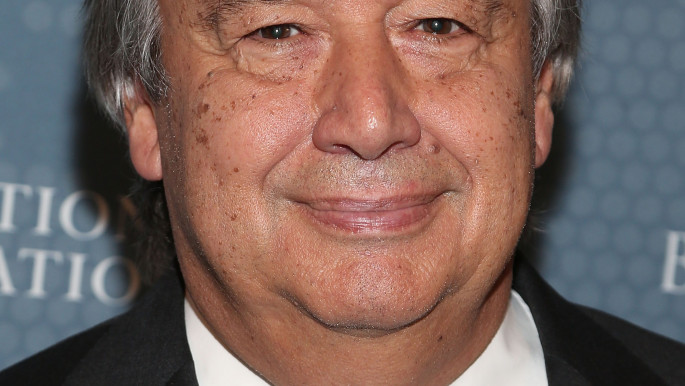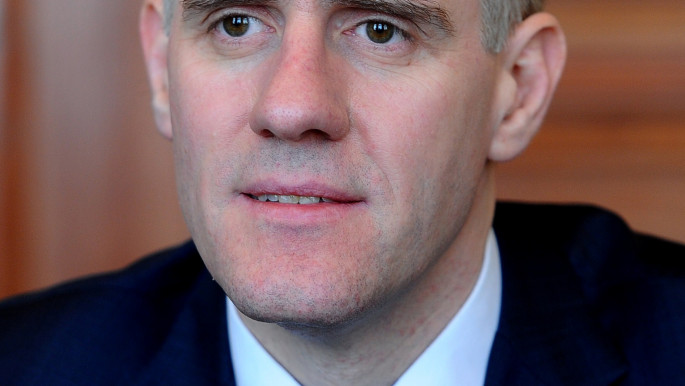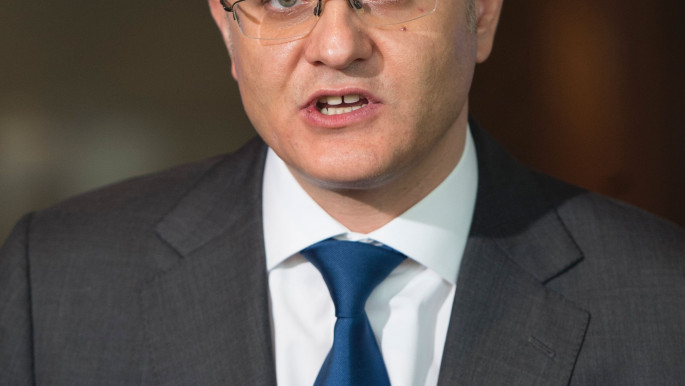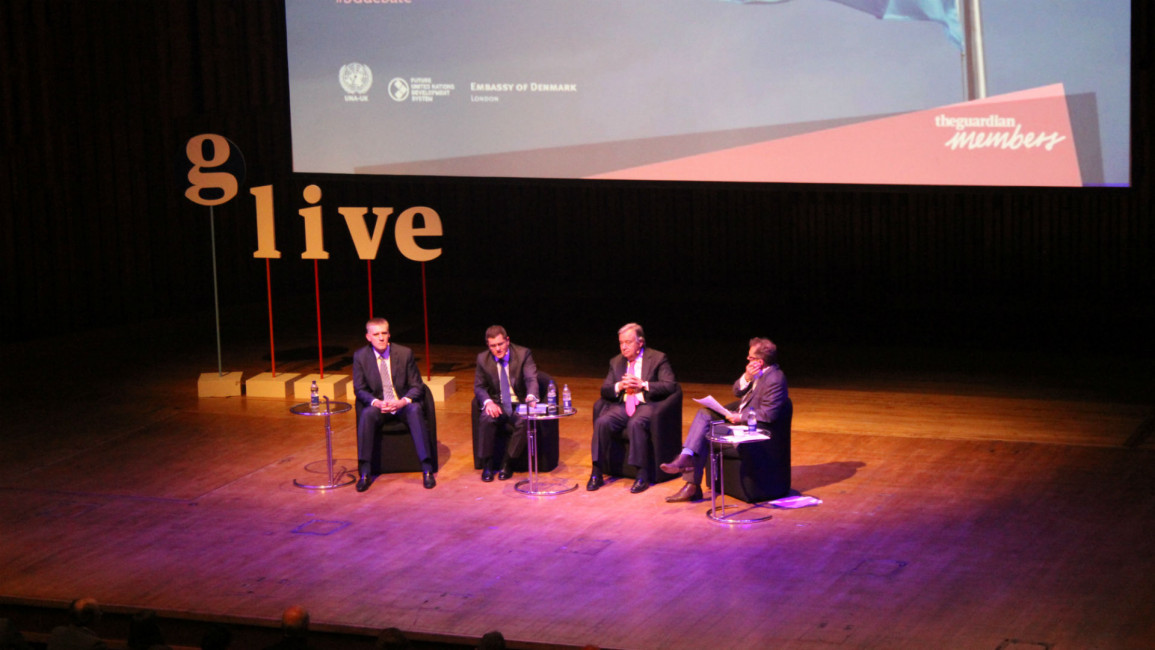
Frustration over 'historic' UN Secretary-General hustings debate
"We want to give people, not just diplomats in New York, a chance to get to know the candidates," said Natalie Samarasinghe, executive director of UNA-UK, in her introductory remarks at the debate in London on Friday.
Although UN secretaries-general - including the incumbent Ban Ki-moon and most of his predecessors - are usually chosen behind closed doors, the decision to hold the selection process before the public for the first time followed a international internationalists' campaign demanding the change. As such, many were excited to see this second debate between the potential UN heads, following on from the initial New York round in April.
An all-male affair
The Guardian-hosted event got off to a shaky start, owing to the absence of eight of the 11 men and women fighting for the post, and because those who did turn up made for an all-male panel.
This, however, was through no fault of the organisers, and was simply down to the busy schedules of contenders.
"What can I say, never work with children, animals or candidates for high office," joked the night's moderator, Mark Oxley.
| The contenders in London | ||
| Antionio Guterres, 67, Former Prime Minister of Portugal |
 |
- Served as PM from 1995 to 2002 - UN high commissioner for refugees 2005 to 2015 - Physics and electrical engineering background - Academic career before entering politics in the 1970s |
| Igor Luksic, 39, Former Prime Minister of Montenegro |
 |
- Montenegro's foreign minister since 2012 - Formerly prime minister (2010-2012) - Strong advocate of his country's EU entry |
| Vuk Jeremic, 40, former Foreign Minister of Serbia |
 |
- President of United Nations General Assembly (2012-2013) - Harvard and Cambridge graduate - As Serbian FM, handled the breakaway of Kosovo |
Unlike the fierce debates that have shaken the United States' political scene recently, Friday's affair in London was much more reserved, relaxed - even frustratingly so.
The proceedings kicked off with a simple job interview-style question about what made each candidate the best person for the job, to which Vuc Jeremic answered that public service was about catering to "real people".
He then asked for a show of hands for how many people felt that the UN was really delivering, with raised "yes" hands standing out like dry straws in a barren desert.
— Ben Quinn (@BenQuinn75) June 3, 2016
" style="color:#fff;" class="twitter-post-link" target="_blank">Twitter Post
|
Soundbite politics
The candidates briefly danced over topics ranging from the Islamic State group to gender mainstreaming, Syria and the refugee crisis, offering bland, generic soundbites for the audience gathered in London's Barbican centre.
"They are just keeping up with the tradition of throwing words and trying to solve problems with words... its just for public consumption, I'm sure when they talk to bureaucrats its different," said Rakesh Mathur, an audience member from India.
"When it comes to Syria they talk in general terms... One of them said that all the parties have different opinions, but 'I will work for peace'. Does he think that no-one has tried this before?"
Inclusive?
While the event was touted by The Guardian as "a small piece of history in the making", this attempt by the UN at greater inclusiveness and transparency left some frustrated by the event's format. Frustratingly, many of the questions were asked by former diplomats, politicians and those with diplomatic backgrounds - people who have undoubtedly already had the chance to have their voices heard on major platforms.
The event, which only allowed for a few more than a handful of questions to be asked, saw British Lord Hannay of Chiswick, Danish Ambassador Claus Grube and a former British envoy pose questions to the candidates.
The frustration at this was expressed by attendees at the venue and on social media.
|
— Charlotte Hannah (@C_H_Everything) June 3, 2016" style="color:#fff;" class="twitter-post-link" target="_blank">Twitter Post
|
"I thought it it was interesting, however a concern I had was that where the questions came from didn't seem to be representative of the people here on the night," said one attendee.
"My workplace, which is UN House Scotland, encouraged people to submit questions, but I don't think that the kind of things that were brought up were shared in this... some questions lacked depth."
Passion proves a point
While this was clearly not a night of winners and losers, former Portugese PM Guterres seemed to make the biggest impression with passionate oratory about improving conditions for peacekeepers, and even a controversial promise that he would force richer countries to dedicate more troops to these international forces - a move that could mean former colonies would once again meet with the soldiers from their old imperial masters, and be asked to fight alongside each other.
Meanwhile, Luksic and Jeremic failed to make the same impression, with the latter most notably making several proud references to his manifesto - a document many may have hoped they wouldn't have to read by attending the event.
In all, the hustings only touched lightly upon pressing topics, while missing out many others in an hour and a half that was no less than exasperating.
None of the candidates seemed to offer anything new with regards to Syria - one of the most pressing conflicts of our time, nor was there any mention of Palestine and its long and arduous quest for statehood. Among other complaints on social media, there were also mentions of the event's silence on the scandal of unpaid internships at the UN - an issue that may be resulting in elitism in the organisation's ranks.
— Canadian Intern Assn (@canadianinterns) June 3, 2016
" style="color:#fff;" class="twitter-post-link" target="_blank">Twitter Post
|
Given that the candidates only had an hour to share between themselves, however, this may have been more down to a lack of time than of concern.
If the UN is to reform itself from its toothless-tiger image, however, there remains much to be done.
The efforts of those who pushed for the debates to be made public for the first time are certainly praiseworthy, though after Friday's proceedings it remains clear that there is still a long way to go before the opaque shroud covering this secretive selection process is finally cast off.
Follow Taufiq Wan on Twitter: @taufiq_wan




